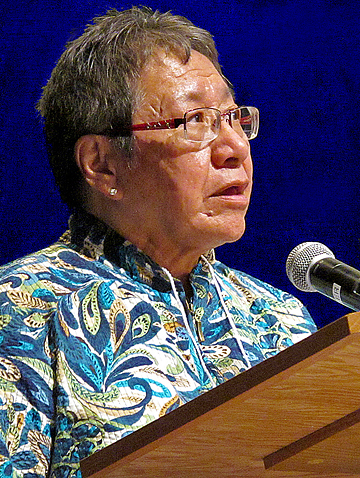Stoney Nakoda elder reflects on white buffalo, respect
COFFEE WITH WARREN, with Warren Harbeck
Cochrane Eagle, June 6, 2012

Stoney Nakoda elder Tina Fox, a popular public speaker on First Nations cultural values, was humbled by being in the presence of a white buffalo. Photo by Warren Harbeck
Last week’s column on Dale Nemeth’s life-changing encounter with a white buffalo drew an affirming response from a highly regarded Stoney Nakoda elder.
“For sure, meeting the white buffalo is an awesome and spiritual experience,” Tina Fox, of Morley, wrote about her own encounter with Teton, the white buffalo which has been a guest at the Rafter Six Ranch Resort near Seebe for the past year-and-a-half.
“My children and I went to visit the buffalo when he first arrived at the ranch. We had taken tobacco and smudge. There were a few non-Native people there and they were trying to pet the buffalo and he didn't appreciate that, pushing them away with his head.
“When they left, we approached him carefully and I told him we were there to offer tobacco and prayer. After the tobacco offering, I lit the smudge and prayed. He walked over closer to where I had the bowl of smudge and he smudged himself!
“It was truly a humbling experience for me and all my children.”
I wasn’t surprised at all by Tina’s observations. For years she has been a mentor to me in the ways of being truly human as expressed in the values and teachings of her First Nations heritage. The pivotal value for life, as Tina sees it, is respect – so beautifully illustrated by her gentle approach to the white buffalo at the Rafter Six.
“Respect is the basis for our existence,” she told me recently. “In order to survive, we respect the self, Creator (Wakâ Ta-ogarhe), all human beings, all of creation and everything in it.
“There are many cultural teachings that help us honor the teachings of respect. We are taught that people are created by the Creator and we must treat ourselves and others as that created by God (Creator/Wakâ), no less or more than ourselves. We are taught everything that God/Wakâ created has His spirit in it or them, and we must respect them as such. Respect is built into every ceremony, rite, etc. Every protocol for how we approach an Elder for prayer or advice – ceremony, dance, and so on – is based on respect.
“It is the foundation for our traditional teachings and culture.”
Having said this, Tina is well aware that many of the younger people of her community seem lost.
“Unfortunately, due to the colonization process of the government and the residential schools' tactics to take the ‘Indian’ out of the Indian child, many of us lost our self-respect and respect for others, including the land and animals, our ceremonies, and so on.
“However, due to the perseverance and strength of our ancestors, we still retain much of our teachings, and I am very grateful to our ancestors,” she said, something for which I, too, am very grateful, in view of the respect-filled wisdom of Stoney Nakoda elders that has so enriched my own life.
To illustrate that such respect has not been totally lost among all the younger generation, however, I need look no further than Tina’s daughter Terry.
Terry Fox is a graduate student at the University of Victoria, where she’s presently writing her thesis for a Ph.D. in public administration.
Like her mother, she too is not ignorant of the effect of cultural disorientation on many First Nations people, an issue facing First Nations administrators nationwide. She has sensed this, in particular, in the disorientation resulting from the collision between the sharing values of traditional First Nations communal culture and the competitive money-based values of a culture of individualism.
“To many people, the word respect is easier said than done, especially when money comes into the picture,” she once told me. “Money, and its partner greed, makes people forget about respect.”
Back to the wisdom of the white buffalo, perhaps one lesson all of us can learn is an attitude of gratitude and generosity motivated by respect. Thanks, Tina and Terry, for this good reminder.
© 2012 Warren Harbeck
JoinMe@coffeewithwarren.com